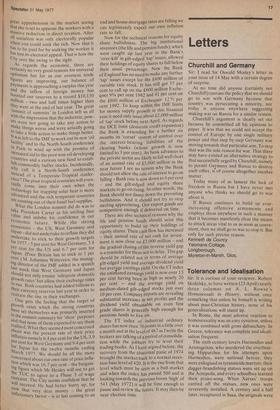Tolerance and idealisation
Sir: It is curious of your reviewer, Robert Skidelsky, to have written (23 April) nearly three columns on A. • L. Rowse's Homosexuals in History, without once remarking that unless he himself is writing about post-Christian history, none of his generalisations will stand bp.
In Rome, the most adverse reaction to homosexuality was an easy cynicism, unless it was combined with gross debauchery. In Greece, tolerance was complete and idealisation frequent.
The sixth-century lovers Harmodios and Aristogeiton, who murdered the overbearing Hipparchos for his attempts upon Harmodios, were national heroes: they were eulogised as tyrannicide martyrs; their slagger-brandishing statues were set up on the Acropolis, and every schoolboy learned their praise-song. When Xerxes' troops carried off the statues, new ones were reverently installed. A century and a half later, recaptured in Susa, the originals were restored as a national treasure by Alexander.
Homoerotic poets like Sappho and Anakreon were showered with honours; the Sacred Band, a regiment recruited from pairs of lovers, was the corps d'elite of the Theban army. 'The stigma attached to this disability' seems hardly an appropriate comment.
It is noteworthy that neither Aristophanes in his satire The Clouds, nor Sokrates' final accusers, thought it worth while to capitalise in terms of sexual innuendo on his clique of handsome young aristocrats. Had there been a possible smear in it they would have done so; people who believed The Clouds would believe anything. His `corruption of the youth' was purely religious and political. Homosexuality would not have influenced the jury.
How, therefore, can stigma, difference, alienation, account for Plato and Sokrates and Solon and Alexander, to name a few from an extensive choice? I find it hard to believe that Michelangelo, had he been a contemporary of Phidias, would have found life too easy and got nothing done. The real explanation of homosexual achievement may be simply .a rechannelling of creativity. Greece was overcrowded for its resources, as the world is becoming today.
Mary Renault Camps Bay, Cape Town



































 Previous page
Previous page